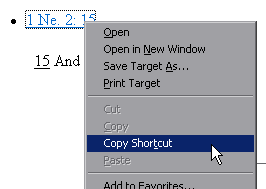
FAIR is a non-profit organization dedicated to providing well-documented answers to criticisms of the doctrine, practice, and history of The Church of Jesus Christ of Latter-day Saints.
Sem resumo de edição |
Sem resumo de edição |
||
| Linha 21: | Linha 21: | ||
==3rd person voice== | ==3rd person voice== | ||
In general | In general write in [http://en.wikipedia.org/wiki/Perspective_(storytelling) "3rd person"] and not 1st or 2cd person. For example: | ||
*'''3rd Person (correct):''' ''Joseph Smith found the plates.'' | *'''3rd Person (correct):''' ''Joseph Smith found the plates.'' | ||
*'''2cd Person (incorrect):''' '"Joseph Smith wrote what you read.'' | *'''2cd Person (incorrect):''' '"Joseph Smith wrote what you read.'' | ||
This style guide gives direction on how FAIRwiki pages should be formatted and organized. Adhering to the approved style will help you create professional and appropriate wiki articles.
This article does not explain how to create pages or use Mediawiki markup language. For help with that, see Help:Editing.
If you have any questions about or suggestions for the style guide, please contact Mike Parker at mparker AT fairlds DOT org.
In general, you should strive to use active voice rather than passive voice in your articles. For example:
In general write in "3rd person" and not 1st or 2cd person. For example:
In general, pages should be organized as follows:
==Criticism== (heading2) A brief explanation of the criticism. ===Source(s) of the criticism=== (heading3) Anti-Mormon books or web sites where the criticism originated ==Response== (heading2) The response should be brief and summary in nature. ==Conclusion== (heading2) A summary of the argument against the criticism. ==Further reading== (heading2) ===FAIR wiki articles=== (heading3) *Links to related articles in the wiki (bulleted) ===FAIR web site=== (heading3) *Links to articles on the FAIR web site; Topical Guide entries go first (bulleted) as follows-- *FAIR Topical Guide: [link] ===External links=== (heading3) *Links to external web pages (bulleted) ===Printed material=== (heading3) *Printed resources whose text is not available online (bulleted)
A template of this page layout, ready for copy-and-paste, is available at FAIRwiki:New_page_template.
To create a page based on an answer to a question submitted to the FAIR web site, use FAIRwiki:Answer_template.
Draft articles are those with limited and/or incomplete content. This should be indicated to the reader by adding a special tag at the top of the page:
{{draft}}
Answers from the FAIR list are articles derived from questions sumitted to the FAIR web site. Indicate this by putting this tag at the top of the page:
{{question}}
Words in headings should not be capitalized, except for:
Please spell check your edits before saving them. There are free programs you can use to check your spelling right in your web browser:
Use American spelling (color, archeology) rather than British (colour, archaeology).
One of the major features of a wiki is the ability to create links within an article to other articles on related subjects. In general, you should strive to create appropriate links to wiki articles and web pages the reader may find useful.
However, do not create links to subjects that are not apologetic in nature. For example, a link to page on Neal A. Maxwell is probably not appropriate, because Elder Maxwell, in and of himself, is not an apologetic topic.
The exception to the general rule is to create a subject page for a topic that will point to reader to specific articles that are apologetically-based.
For example, a page for Gordon B. Hinckley could be created that would simply refer the reader to articles where his life and actions are examined (such as Church reaction to Hofmann forgeries and Downplaying the King Follett discourse.
FAIR's policy is that we will not link to anti-Mormon web pages. If you cite an anti-Mormon web page or book, you may provide the site name (e.g., "Institute for Religious Research" or "Mormonism Research Ministry"), but do not create a link or publish a URL.
Remember, the purpose of the wiki is to give quick answers to commonly-asked questions, then to direct the reader to further resources. It is critical that you provide references for additional reading.
Try to always include:
Published works should be referenced in this format (note the use of quotes and italics):
See the example pages, referenced above, for examples of how to format different types of citations.

Scripture citations should include a link to the scriptural passage on LDS.org, in this manner:
Guidelines:
[http://scriptures.lds.org/1_ne/2/15#15 1 Nephi 2:15]
Instead of using two hyphens to break apart thoughts within a sentence, use and m-dash:
You can create an m-dash by typing the following code:
—
When citing page or date ranges, instead of using a hyphen, use an n-dash. An n-dash is slightly longer than a hyphen, and indicates a range.
You can create an n-dash by typing the following code:
–

FAIR is a non-profit organization dedicated to providing well-documented answers to criticisms of the doctrine, practice, and history of The Church of Jesus Christ of Latter-day Saints.
We are a volunteer organization. We invite you to give back.
Donate Now